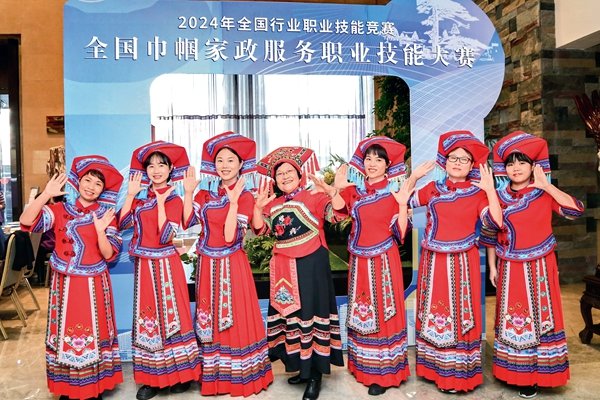National Competition Advances Women's Domestic Services to New Level

To study and implement the guiding principles of the third plenary session of the 20th Communist Party of China (CPC) Central Committee, to implement General Secretary of the CPC Central Committee Xi Jinping's important instructions on work related to domestic services, and to act in accordance with the requirements outlined in a guideline on upgrading domestic services and making them more accessible (issued by the General Office of the State Council), ACWF has cooperated with relevant departments to boost development of the women's domestic-service sector. The national women's domestic service vocational skills competition was held from November 4 to 6, in Hefei, capital of East China's Anhui Province. The competition helped advance the sector's development to a new level.
The national women's domestic service vocational skills competition was held from November 4 to 6, 2024, in Hefei of Anhui Province. Chinese State Councilor Shen Yiqin, also President of the ACWF, attended the opening ceremony held on November 4 and declared the competition open.


Organizing the competition was a concrete measure to implement the guiding principles of General Secretary of the CPC Central Committee Xi Jinping's important instructions, and an important part of the campaign to encourage women to make greater achievements. To promote high-quality development, efforts should be made to better support women, promote employment, serve families, and improve people's well-being, Shen stressed. She called for cultivating more capable women domestic-service workers and brands, and promoting the high-quality development of the domestic-service sector.
Liang Yanshun, Secretary of the CPC Anhui Provincial Committee, Huang Xiaowei, Vice-President and First Member of the Secretariat of ACWF, Wu Xiuzhang, Vice-Minister of Human Resources and Social Security, Li Yongsha, deputy international trade negotiator of the Ministry of Commerce (MOFCOM), and Zhang Shixin, Deputy Secretary General of the National Development and Reform Commission (NDRC), delivered speeches during the opening ceremony.
Huang noted General Secretary Xi has attached great attention and care to domestic services, and he has stressed the need for ensuring this work, which is beneficial to all, be done well. She added women's federations at all levels should act in accordance with Shen's requirements to upgrade women's domestic services and make them more accessible, to benefit more women, children and families. "This competition is of high value, and it covers many types of services. We should take this competition as an opportunity to enhance the competence of women working in the domestic-service sector, and guide them to make greater contributions to promoting high-quality development and creating better lives," Huang added.
The competition was designed to select the best eldercare workers, maternal-child nursing workers, housekeepers, and professional organizers, and to provide a stage for domestic-service trainers and domestic-service managers to showcase their skills. More than 14,000 competitors, from 31 provinces, autonomous regions, and municipalities, and the Xinjiang Production and Construction Corps, participated in local preliminary contests. Of those competitors, 192 advanced to the national finals.
The competition concluded on November 6. Huang presented awards to the winners, and she declared the competition closed. Of the 192 finalists, 54 received awards, including six first prizes, 18 second prizes and 30 third prizes, and 42 were awarded for excellence. Moreover, 10 local women's federations won awards for outstanding organization, and five agencies for making a special contribution.
The competition, hosted by ACWF, Ministry of Human Resources and Social Security, NDRC, MOFCOM, and All-China Federation of Trade Unions, was listed as a national, first-class competition for the first time, and that listing indicated development of the domestic-service sector had advanced to a new level.
In recent years, women's federations at all levels have promoted women's domestic services, to expand women's employment and increase their incomes, to provide services to the elderly and children, and to help families solve difficulties. The federations have supported a combined 6,250 enterprises (agencies) in the sector, ensured more than one million workers have received training annually, helped more than 900,000 women find jobs in the sector, and established around 14,000 women's domestic-service stations in communities.

Excellent Match
On November 6, the finals of the national women's domestic services vocational skills competition concluded, in Hefei, Anhui. During the previous few days, 192 women, from 32 delegations across the country, participated. They used the event to promote training, and to improve the quality of their skills.
"In preparation for the competition, we worked hard to hone our skills. We raced against the clock on the field, and we strived to showcase our skills to the fullest," said Xu Wei, a first-prize winner. "This was an excellent opportunity, and stage, for us to exchange skills and promote mutual progress," added Tang Yixin, an eldercare worker from Central China's Hunan Province. "This was a match among competent competitors," said Guo Dalei, a judge during the finals. "This competition was of a high standard, and a large scale, and it presented top-notch skill levels. Contestants in each event demonstrated the 'craftsman spirit,' and showed outstanding talents," he added.
Cultivating Brands
Since the 13th National Women's Congress of China, in 2023, women's federations at all levels have leveraged their roles as bridges. They have introduced policies and measures to cultivate women's domestic-service brands, and they have explored and established several standard systems, with a focus on improving the quality of the services, and making the services more accessible. On November 4, during the opening ceremony of the competition, group standards for the evaluation of women's domestic-service agencies, and the logo for women's domestic services, were released.
"We released the group standards, and the logo, during the competition, to make our women's domestic services more competitive, to cultivate more brands, and to bring higher-quality services to people's doorsteps," said an official with ACWF Department for Women's Development. "We believe, with the joint efforts of women's federations at all levels and the Ministry of Human Resources and Social Security, women's domestic services will certainly play a role in benefiting the people, stabilizing employment, increasing people's incomes and promoting social harmony."
Promoting Employment
In 2000, China's Ministry of Labor and Social Security officially recognized the profession of "domestic-service worker." Since then, an increasing number of women have joined the ranks. Statistics indicate, at present, more than 85 percent of domestic services in China are provided by women.
A widely held belief in Southwest China's Guizhou Province is, "a woman who finds a job in the domestic-service sector will benefit two families, and will bring happiness to both children and the elderly." In North China's Hebei Province, the "Hebei Good Sister" project has guided women, especially women college students, to change their perceptions of domestic services, and to pursue careers in the sector.
Coincidentally, women — an estimated 76,500 "Good Sisters" — from Hebei have found jobs in the sector in Beijing, and the work they have been performing has been conducive to the promotion of coordinated development of the Beijing-Tianjin-Hebei region. During the competition, many of the women displayed their skills, and shared their stories, to inspire more women to enter the sector.

Serving Families
As aging of the population continues to progress, and as people's living standards continue to improve and young Chinese take advantage of the recently implemented three-child policy, there is a corresponding increase in demand, across China, for high-quality, domestic-service workers, including housekeepers, eldercare workers and maternal-child nursing workers.
Many localities have adopted approaches — such as services and programs — to meet the surging demand. In Anhui, demonstration projects, named "Beautiful Anhui," have been implemented to introduce women's domestic services into communities.
In North China's Inner Mongolia Autonomous Region, an alliance was established to provide women's domestic services. The alliance, "Northern Frontier Sisters," is tasked with delivering targeted services to people's doorsteps.
In Xinyu, a city in East China's Jiangxi Province, efforts were made to mobilize women domestic-service workers to help the elderly, by cutting their hair and cleaning their homes. "Domestic-service workers bring not only high-quality services, but also emotional value to their employers, as they help shed their burdens of doing domestic chores," says Liu Haiyan, a domestic-service trainer.
The national competition provided a platform for exchanges and showcases of skills, it served as both a competition and a meeting to call on more women to enter the sector, and it marked a new starting point for the development of the women's domestic-service sector.
Sources: ACWF Department for Women's Development and Women Voice
(Women of China English Monthly Dcember 2024)
Editor: Wang Shasha
Please understand that womenofchina.cn,a non-profit, information-communication website, cannot reach every writer before using articles and images. For copyright issues, please contact us by emailing: website@womenofchina.cn. The articles published and opinions expressed on this website represent the opinions of writers and are not necessarily shared by womenofchina.cn.








.jpg)

 WeChat
WeChat Weibo
Weibo 京公网安备 11010102004314号
京公网安备 11010102004314号